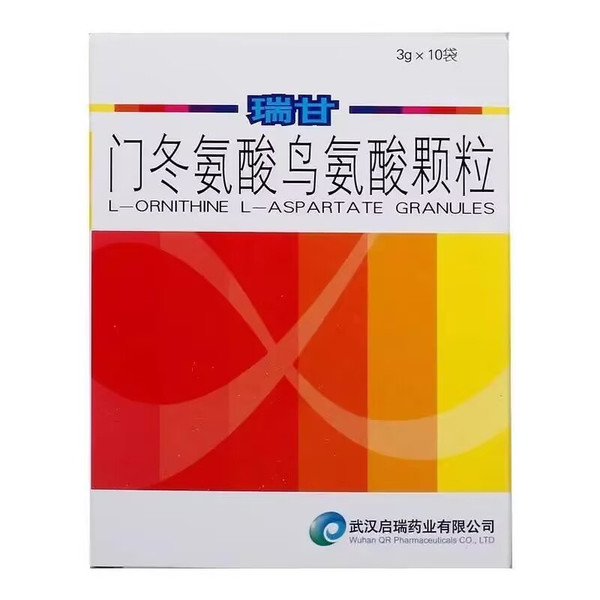Product Overview
[Drug Name]
Generic Name: L-Ornithine Aspartate Granules
Trade Name: Ruigan
English Name: L-Ornithine L-aspartate Granules
Chinese Pinyin: MenDongAnSuanNiaoAnSuanKeLi (RuiGan)
[Ingredients]
L-Ornithine Aspartate. Chemical Name: (S)-2,5-Diaminopentanoic Acid-(S)-2-Aminosuccinate Molecular Weight: C9H19N3O6
[Properties]
This product is white or off-white granules with a sweet-sour taste.
[Indications]
Treatment of hyperammonemia due to acute and chronic liver diseases such as cirrhosis, fatty liver, and hepatitis. It is particularly suitable for the treatment of early-stage disturbances of consciousness or neurological complications.
[Dosage and Administration]
Unless otherwise specified, take 1-3 times daily after meals. If necessary, the dose may be increased without risk, or alternated with injectable L-Ornithine Aspartate every other week.
[Adverse Reactions]
This product has no significant adverse reactions when taken orally. A small number of patients may experience nausea, vomiting, or abdominal distension, which resolves spontaneously after discontinuation of the drug.
[Contraindications]
This product is contraindicated in patients with allergies to amino acid drugs and severe renal failure (serum creatinine >3mg/100ml).
[Precautions]
1. When using large amounts of this product, monitor blood and urine urea levels. 2. Keep out of reach of children.
[Use in Special Populations]
Precautions for children: Reduce the dosage and follow your doctor's advice.
Precautions for pregnancy and lactation: Safety has not been established. This product has not been found to cause reproductive toxicity in animal studies.
Precautions for the elderly: This study has not been conducted and no reliable references are available.
[Drug Interactions]
This study has not been conducted and no reliable references are available.
[Pharmacological Actions]
This product provides substrates for the synthesis of urea and glutamine. Glutamine is a detoxifying product of ammonia and also serves as a storage and transport form of ammonia. Under physiological and pathological conditions, the synthesis of urea and glutamine is affected by ornithine, aspartic acid, and other dicarboxylic acid compounds. Ornithine is involved in nearly the entire process of urea cycle activation and ammonia detoxification. During this process, arginine is formed, which then breaks down into urea to form ornithine. Aspartic acid participates in nucleic acid synthesis within hepatocytes, thereby facilitating the repair of damaged hepatocytes. Furthermore, aspartic acid indirectly promotes the tricarboxylic acid cycle within hepatocytes, boosting energy production and restoring the functions of damaged hepatocytes.
[Storage]
Protected from light, sealed, and stored in a dry place.
[Specifications]
3g*10 bags
[Expiration Period]
30 months
[Approval Number]
National Medicine Standard No. H20090160
[Manufacturer]
Company Name: Wuhan Qirui Pharmaceutical Co., Ltd.







